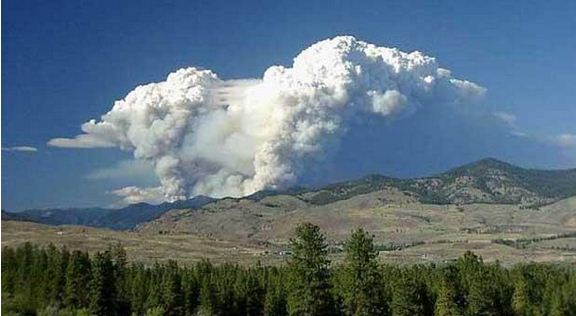
Exactly 10 years ago today the Thirtymile fire took the lives of four U.S. Forest Service firefighters and triggered a series of events and knee-jerk reactions that have been affecting firefighters ever since.
Killed that day were:
Tom L. Craven, 30, Ellensburg, WA
Karen L. Fitzpatrick, 18, Yakima, WA
Devin A. Weaver, 21, Yakima, WA
Jessica L. Johnson, 19, Yakima, WA
The tragic event set a precedent for charging a wildland firefighter with felonies for making mistakes during an emergency fire response. Politicians passed a federal law making it mandatory for the Department of Agriculture’s Office of Inspector General (OIG), which had no experience in wildland fire, to investigate fatalities of U.S. Forest Service personnel that occurred on a fire to decide if any federal laws were broken by firefighters during the suppression of the fire.
After the trainee wildland fire investigator for the OIG finished looking at the Thirtymile fire, on January 30, 2007 Ellreese Daniels, the crew boss of the four firefighters that died, was charged with 11 felonies, including four counts of manslaughter. The charges were later reduced to two counts of making false statements to which Mr. Daniels pleaded guilty on August 20, 2008. He was sentenced to three years of probation and 90 days of work release.
In 2007 the International Association of Wildland Fire conducted a survey of over 3,300 firefighters about the repercussions of a firefighter facing criminal charges following an accident on a fire. Of the full-time employees surveyed, 6% said that because of the possibility of criminal charges they would no longer accept any fire assignments, and 23% said they would not serve as an Incident Commander, the person in charge of all fire suppression activities on a fire. And 23% of the primary-duty firefighters said they would remove some positions for which they were qualified from their Incident Qualifications Card, or “red card. HERE is a summary of their other findings.
The Wenatchee World has an interesting article about the Thirtymile fire. Here is an excerpt that picks up with a discussion about the OIG investigation and the felony charges:
…“It’s not something we’re excited about,” Ken Snell, Forest Service fire director for the Pacific Northwest Region, said of the possibility of criminal prosecution. “No firefighter on any given day goes out there with the intention of hurting anyone.”
And as for the independent review by the Inspector General, he said, “I don’t want to say it wasn’t good, but it had an unintended consequence of shutting down or slowing our ability to learn” from fatal fires.
Snell said the agency now examines minor to moderate incidents or close calls to learn what mistakes are being repeated.
Dick Mangan, a retired Forest Service official who analyzes fire fatalities, said he thinks the changes have had a negative impact on firefighting.
“Unfortunately, four people lost their lives. There were obviously mistakes made at a number of different levels,” he said. “But the way it was (before Thirtymile), everybody else gets the benefit of learning from it, because it is free and open and everyone admits it. Now, there’s always the threat that when an investigation or review team comes in, if I tell them something it may be held against me.”
Fire commanders also know that the decisions they make in an instant, without full knowledge of the situation, and a prosecutor has years to pick apart each and every move and decide whether to file criminal charges.
“That has cast a fairly dark shadow over fire operations for a lot of people,” he said, adding, “Many have chosen not to take jobs that would put them in a liability situation anymore.”
John N. Maclean, author of The Thirtymile Fire published in 2007, said despite his shortcomings, Daniels should never have been prosecuted.
“It was certainly clumsy in its execution, and disastrous in its consequences,” he said. “People left the upper reaches of firefighting in droves, and today, they’re still having trouble filling incident command classes,” he said.
He said the changes won’t make fire managers more accountable.
“Forcing fire managers to obsess about process does not put out fires,” he said, “And having them always looking over their shoulder because they might be charged with felonies that would put them in jail for decades for what may have been a stupid mistake, but was an honest mistake, does nothing for the future of firefighting.”
The Yakima Herald has short bios of the four firefighters who died on the fire.
Shortly after Mr. Daniels was sentenced in 2008, we published the reaction of John N. Maclean, who after writing his book, has become an expert on the Thirtymile fire and the unintended consequences of the OIG investigations.
The Yakima Herald was extremely critical of the U. S. Forest Service and Ellreese Daniels for years leading up to his trial date, but the article they have about the 10-year anniversary shows a much more balanced tone.
Memorial for the four firefighters
The U.S. Forest Service report on the Thirtymile Fire is here. It’s a large 9mb file.
